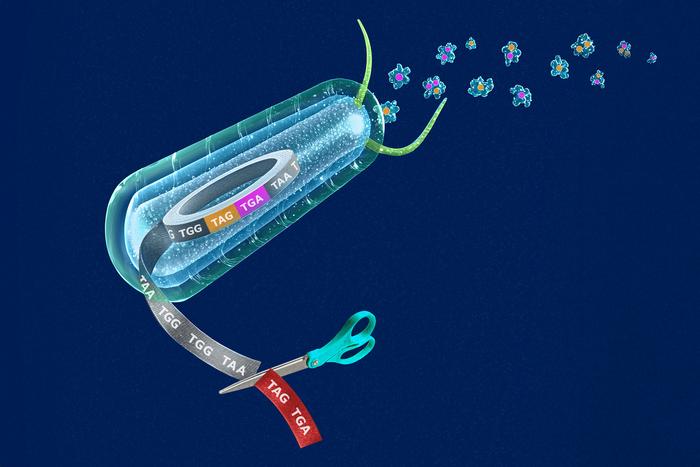In a groundbreaking development, a team of synthetic biologists from Yale University has successfully rewritten the genetic code of an organism, culminating in the creation of a novel genomically recoded organism (GRO) with a single stop codon. This revolutionary work is not only advancing our understanding of genetic malleability but also unlocking the potential for a new class of synthetic proteins with myriad applications in medicine and industry. The implications of this research are profound, indicating a shift towards programmable biotherapeutics and biomaterials.
The newly designed GRO, named “Ochre,” marks a significant leap in genetic engineering by condensing redundant codons, which typically play a non-essential role in coding protein sequences, into a singular meaningful codon. This process allows the organism to utilize its genetic resources more efficiently, offering the ability to produce synthetic proteins that can incorporate nonstandard amino acids, yielding proteins with entirely new chemistries. The study detailing this advancement was published in the journal Nature on February 5, highlighting the intricate blend of creativity and scientific precision that was integral to the project.
A codon represents a triplet of nucleotides in either DNA or RNA that conveys the instructions necessary for synthesizing specific amino acids. In essence, codons act as the lexicon of genetic information, directing cellular machinery to provide the appropriate amino acids in the correct sequence for building proteins. With the innovative engineering of the Ochre organism, the researchers centralized the function of three “stop” codons into one, effectively freeing up previously redundant genetic boundaries for new functionality.
Farren Isaacs, a professor of molecular, cellular, and developmental biology and co-senior author of the study, noted that this research underscores pivotal questions regarding the adaptability of genetic codes. The ability to manipulate not just the sequence but the functional elements of genetic material represents a new frontier in molecular biology. This study is also a continuation of Isaacs’s long-standing research interests in the potential applications of engineered genomes.
Building on earlier endeavors published in 2013, where the first GRO was constructed, the research showcases how advances in genetic engineering are gradually enabling safer genetically engineered organisms. The previous findings had already set precedents for the construction of novel biomaterials with “unnatural” properties, expanding the boundaries of what is possible within synthetic biology. The ability to create advantageously engineered organisms poses new possibilities for research and industry.
Ochre specifically offers significant strides in terms of protein synthesis in the model organism Escherichia coli, widely utilized in biological research and biotechnology. Its genetic coding can now support a wider array of synthetic amino acids, enriching the protein synthesis process and pushing the scope of building complex biological systems. This strategic re-engineering of the genetic code is expected to yield results that surpass current limitations in protein functionality and adaptability.
Jesse Rinehart, another co-senior author of the study and an associate professor at the Yale School of Medicine, characterized this achievement as monumental, driven by an unparalleled scale of genomic editing. The dual expertise from both labs at Yale’s Systems Biology Institute has been critical, blending engineering precision with innovative biological insights. The collaborative efforts between Rinehart and Isaacs, ongoing since 2010, underline the importance of interdisciplinary approaches in pushing the frontier of genetic engineering.
The collaborative research highlights that the process of translating genetic information into functional proteins involves an intricate network of ribosomes, which operate like 3D printers within the cell. The researchers strategically eliminated two out of three stop codons, thereby redirecting the genetic interplay to favor the production of non-standard amino acids instead. Such restructuring provides a significant advantage, allowing for engineered proteins that carry altered properties and functionalities, catering to both therapeutic and industrial needs.
Additionally, the researchers utilized artificial intelligence to assist in the design and engineering of vital translation factors, necessary for achieving the desired outcomes in their engineered strain. These advancements herald a future where programmable biologics can be designed with a deliberate focus on parameters such as lower immunogenic responses and improved conductivity in biomaterials. The engineering of Ochre creates a pathway not only for scientific exploration but also for actionable solutions within biotechnological applications.
As Isaacs and Rinehart look towards the future, they are also contemplating the potential societal implications of their findings, emphasizing the need for a balance between scientific inquiry and its practical applications. With the wisdom gained from their previous research and the robust capabilities of their new GRO, the team aims to explore further applications that provide tangible benefits for human health, industrial processes, and beyond. The groundwork laid by this research is expected to inspire a wave of innovations in synthetic biology, driving advancements that could reshape several fields.
This pioneering work by Yale University researchers underscores the increasing interplay between biological sciences and technological advancements. The Innovations in protein design and manipulation have the potential to drive significant progress in creating next-generation therapies and materials, ultimately benefiting society at large. The promise of lighter yet more effective medications, for instance, could dramatically change the landscape of medical treatments, leading to improved patient outcomes and enhanced quality of life.
As the field of synthetic biology continues to advance rapidly, the successful implementation of Ochre into practical applications will depend on ongoing interdisciplinary collaboration, as seen in this research team. This progress sets the stage for a future in which the language of life can be reinterpreted and rewritten, expanding not just the frontiers of scientific knowledge but also harnessing these discoveries for the greater good of humanity.
Subject of Research: Genomic recoding and the creation of a novel genetically engineered organism.
Article Title: Synthetic Biology Breakthrough: Yale’s Genomically Recoded Organism
News Publication Date: February 5, 2024
Web References: https://www.nature.com/articles/s41586-024-08501-x
References: Previous studies referenced in the article.
Image Credits: Yale University / Michael S. Helfenbein
Keywords: Synthetic biology, genomic recoding, novel proteins, genetic engineering, biotherapeutics, amino acids, biomaterials, Yale University.
Tags: biomaterials developmentcodon optimization techniquesengineered synthetic proteinsgenetic code rewritinggenetic malleability researchgenomically recoded organismgroundbreaking genetic engineeringNature journal publicationnonstandard amino acidsnovel protein applicationsprogrammable biotherapeuticsYale University synthetic biology





